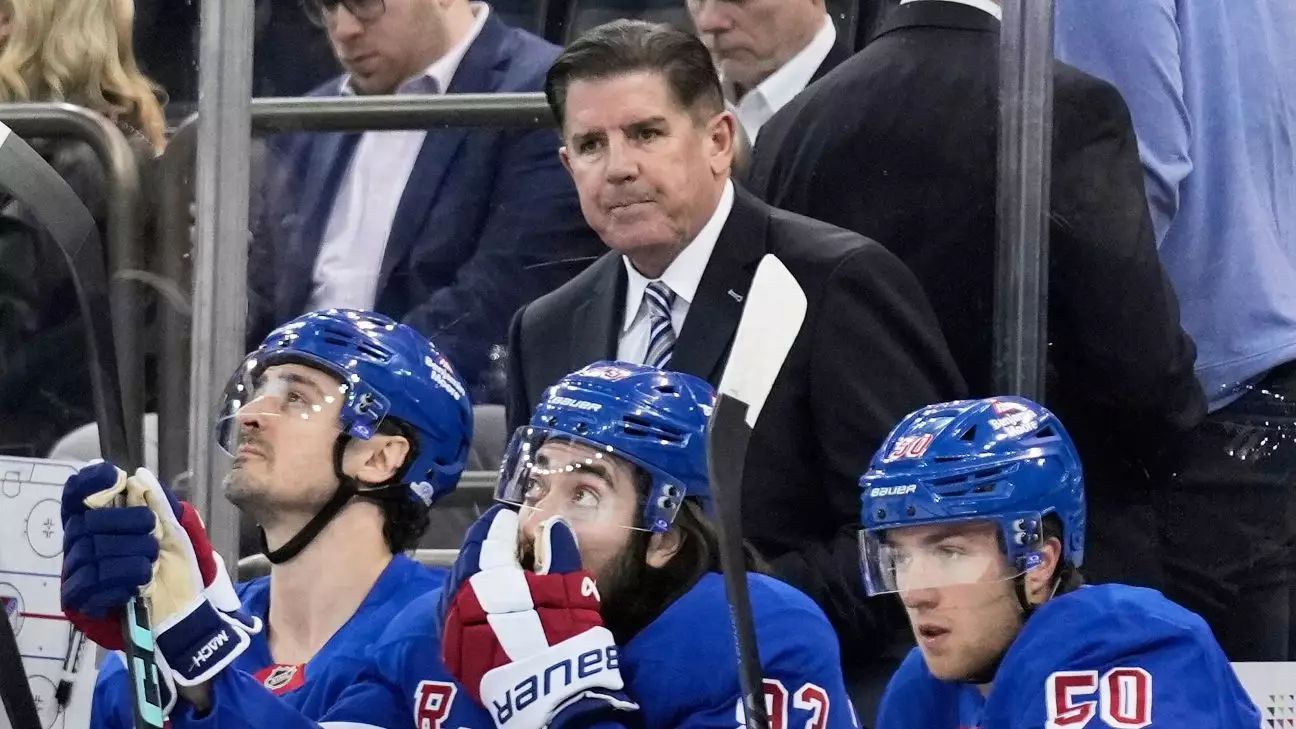Once again, the New York Rangers have succumbed to the unyielding pressures of professional hockey, making the controversial decision to sever ties with head coach Peter Laviolette. The announcement, made by general manager Chris Drury, marks yet another chapter in a disturbing trend for the franchise, which now finds itself desperately searching for its fourth head coach since 2021. Laviolette, who had a year left on his contract, was released shortly after a disappointing season sans playoff contention, despite elevated expectations that accompanied last year’s impressive run to the Eastern Conference finals. This abrupt decision raises questions about the core philosophies guiding this storied organization in an environment that increasingly prioritizes short-term success.
Unpacking the Disappointment
For most franchises, a 55-win season and 114 points—figures achieved under Laviolette’s helm—would be grounds for celebration. Yet for a team with the Rangers’ storied history and ambitions for a Stanley Cup, even such lofty numbers can be upended by unmet expectations. The team’s strong start, characterized by a 12-4-1 record, crumbled into a series of misfortunes and inconsistencies that echo deeper issues within the franchise. The sizable talent pool simply failed to translate into success, prompting a series of mid-season trades intended to shake up the locker room dynamics. The departure of key players—captain Jacob Trouba and forward Kaapo Kakko—serves as a disheartening indicator of a franchise in an identity crisis.
An Identity Crisis in the Making?
It is genuinely alarming to witness a team with such a rich lineage endure multiple coaching upheavals within a short span. The Rangers seem engaged in a relentless pursuit of a winning formula, yet time and again they overlook the foundational elements that make for sustained success. Far too often, the franchise has resorted to a quick-fix mentality in hopes that the next coach will unlock the potential of a team filled with all-stars. While there is merit to exploring coaching options outside of the organization—including names like John Tortorella and Joel Quenneville—such a revolving door strategy invites chaos rather than fostering stability.
The coaching carousel reflects an institutional panic—one fueled by a fear of stagnation and mediocrity. However, this erratic leadership seems to overlook the fact that continuity breeds familiarity, and familiarity fosters a culture of success. From an outsider’s perspective, the Rangers’ front office is out of touch with the realities of creating a sustainable winning environment.
A Glimpse into the Future
As the Rangers set their sights on acquiring a new coach, the imminent question lingers: what kind of team do they aspire to be? The myriad of moves executed throughout the last season suggest an organization willing to gamble extensively with its roster to find immediate results. This philosophy tends to overlook the essential factors that contribute to team chemistry, morale, and long-term growth. Scouting for prospective coaching talent must transcend mere names and instead focus on candidates who can harmonize a multi-faceted roster with varied playing styles.
This franchise’s history is rich with exciting moments, yet recent performances tell a tale of frustration and unrealized dreams. To break free from this cycle, the Rangers must prioritize vision over short-sighted ambitions. A new head coach hasn’t merely to be a tactical genius; they must embody the spirit of a mentor who can cultivate the next generation of Rangers.
Where Does Responsibility Lie?
Ultimately, the responsibility of success lies not just with the coach, but with the entire organization, from management down to the players. For a team with a fan base hungry for success, the notion that resolving flags issues with coaching changes can lead to immediate results is dangerously naive. Structural changes should also encompass player development initiatives, scouting protocols, and roster management strategies—none of which can be rectified by a simple firing of yet another coach. It is crucial that the Rangers do not continue this pathway of chaos but instead consider a holistic approach that invests in its foundational aspects.
The fallout from Laviolette’s dismissal might be a painful moment, but it could also serve as the catalyst for a much-needed reevaluation of the franchise’s philosophy. Only time will tell if the New York Rangers can harness their ambitions into a cohesive vision that truly reflects their deep-rooted legacy in the NHL.


Leave a Reply